The Intel SSD 760p 512GB Review: Mainstream NVMe Done Right
by Billy Tallis on January 23, 2018 11:30 AM ESTRandom Read Performance
Our first test of random read performance uses very short bursts of operations issued one at a time with no queuing. The drives are given enough idle time between bursts to yield an overall duty cycle of 20%, so thermal throttling is impossible. Each burst consists of a total of 32MB of 4kB random reads, from a 16GB span of the disk. The total data read is 1GB.
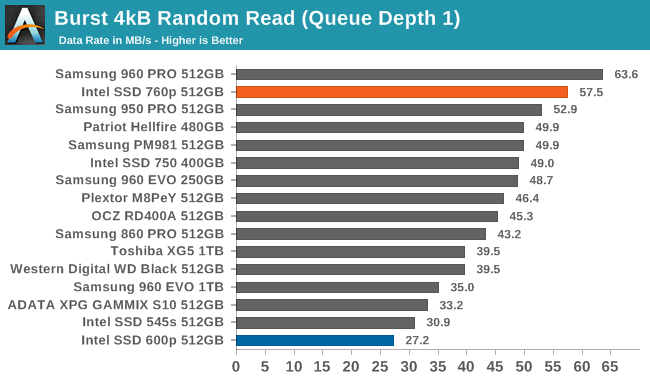
The burst random read performance of the Intel SSD 760p is great, even when compared against MLC-based NVMe SSDs. Samsung's 960 PRO is the only flash-based consumer SSD that currently beats the read latency of the 760p. The 760p has more than doubled the QD1 random read performance of the Intel SSD 600p, and is 17% faster than the Intel SSD 750.
Our sustained random read performance is similar to the random read test from our 2015 test suite: queue depths from 1 to 32 are tested, and the average performance and power efficiency across QD1, QD2 and QD4 are reported as the primary scores. Each queue depth is tested for one minute or 32GB of data transferred, whichever is shorter. After each queue depth is tested, the drive is given up to one minute to cool off so that the higher queue depths are unlikely to be affected by accumulated heat build-up. The individual read operations are again 4kB, and cover a 64GB span of the drive.
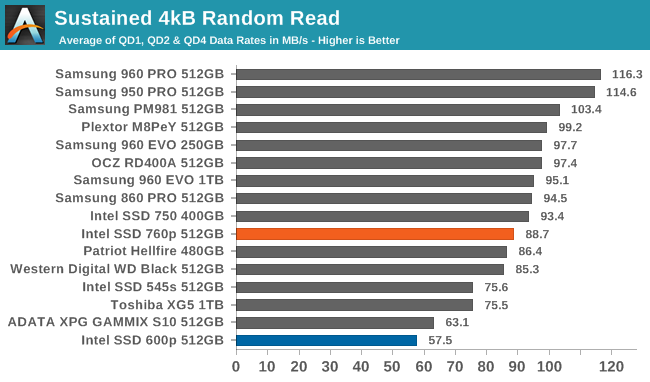
With a longer test runtime and some higher queue depths involved, the Intel SSD 760p no longer stands out from the crowd. Its sustained random read performance is reasonable given its pricing and the current field of competitors, but in a few months time it may be looking rather sluggish. The 760p is about 5% slower than the Intel SSD 750, but on the other hand it is 54% faster than the 600p.
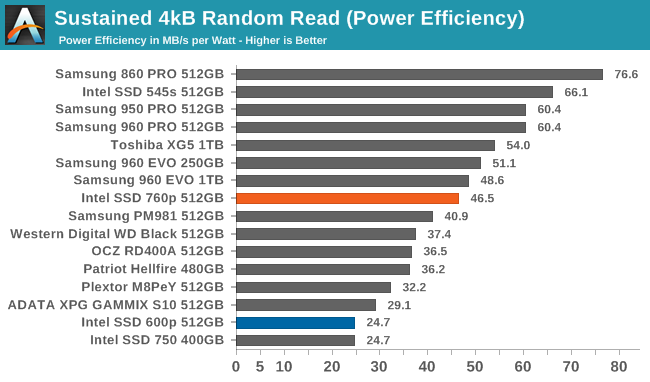
The power efficiency of the Intel SSD 760p during random reads is about average. Samsung's SSDs dominate the top half of the chart, and the two SATA SSDs hold the top two spots, showing that the performance of NVMe SSDs still doesn't offset their increased power consumption. Intel's previous consumer NVMe SSDs are tied for last place in power efficiency: the 750 is reasonably fast but power hungry, while the 600p has more modest power requirements but is quite slow.
 |
|||||||||
The Intel SSD 760p has decent random read performance at low queue depths, but it doesn't scale well at all with higher queue depths. By QD4, Samsung's drives have started pulling away, and at QD8 and higher most drives are faster than the 760p. Even Samsung's SATA SSDs have a clear lead over the 760p before they hit the wall of SATA performance limits. At QD32, most other NVMe drives are much faster than the 760p, and the high-end drives are all at least twice as fast.
The power consumption of the Intel SSD 760p during the sustained random read test is lower than any NVMe SSD we've tested so far except the Toshiba XG5.
Random Write Performance
Our test of random write burst performance is structured similarly to the random read burst test, but each burst is only 4MB and the total test length is 128MB. The 4kB random write operations are distributed over a 16GB span of the drive, and the operations are issued one at a time with no queuing.
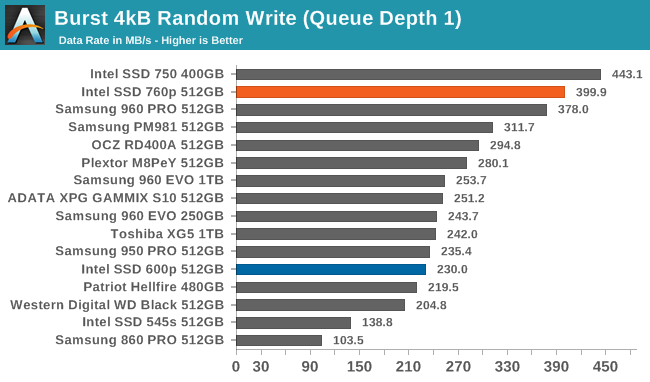
The burst random write performance of the Intel SSD 760p is second only to the Intel SSD 750. Since the 750 is based on an enterprise SSD platform with MLC NAND, this regression isn't at all surprising. That the 760p manages to beat the Samsung 960 PRO is quite an accomplishment. The 760p is also 73% faster than the Intel 600p on this test.
As with the sustained random read test, our sustained 4kB random write test runs for up to one minute or 32GB per queue depth, covering a 64GB span of the drive and giving the drive up to 1 minute of idle time between queue depths to allow for write caches to be flushed and for the drive to cool down.
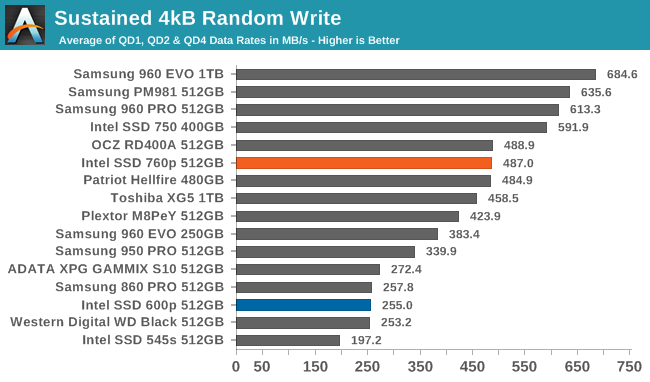
On the sustained random write test that involves some higher queue depths, the performance of the Intel SSD 760p is good but not outstanding. Several of Samsung's drives and the Intel SSD 750 are faster. However, the 760p is on par with some of the slower MLC-based competitors and is almost twice as fast as the Intel SSD 600p.
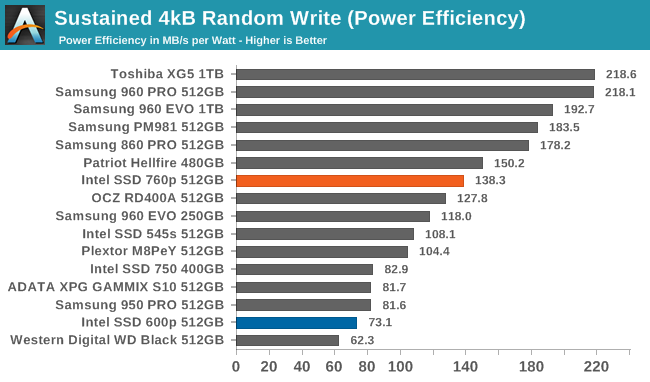
The power efficiency of the Intel SSD 760p during random writes is a bit above average, and is substantially better than any previous Intel consumer SSD. The Toshiba XG5 and most of Samsung's recent drives are far more efficient.
 |
|||||||||
The random write performance of the Intel SSD 760p saturates around QD4 at 600 MB/s. Most high-end NVMe drives continue showing improvement up to QD8, and the Samsung 960 PRO and EVO both top out with over twice the throughput of the Intel SSD 760p. The 760p is delivering twice the performance of the Intel SSD 600p with the same power consumption, but that's one of the few comparisons where the 760p is the clear winner.










51 Comments
View All Comments
rrinker - Wednesday, January 24, 2018 - link
It's not just the speed, it's the handling. A better analogy might be one of the supercars that can hit 300mph.See, in my 25mph residential neighborhood, I often have people running up behind me wanting to go 40 or more. Then I take a turn without touching the brakes, and suddenly they disappear from my mirror. But then my 1993 pickup truck can do the same, so I guess I don't need my BMW after all.
Only - one of those old hard drives I still have in a drawer from 1993 just won't keep up with even the worst SSD I could buy.
Pastuch - Monday, January 29, 2018 - link
The difference between a PC and a BMW is one of them will help you keep your virginity and the other will help you lose it. If the PC is a status symbol to you then I'd suggest you skip your next upgrade and buy yourself a new wardrobe. A 1080 Ti does not equal a hotter girlfriend.megapleb - Tuesday, January 23, 2018 - link
That's certainly the result i expect, but in a review, it feels like something that should be shown repeatedly. Without those results, I think the benchmarks can mislead people into poor buying decisions.Makaveli - Tuesday, January 23, 2018 - link
The Intel 750 still looks like the better drive to me just higher power usage.The $482 price from newegg is also outdated.
I can pick up a brand new 750 drive in Canada for $218 CAD which is $175 USD which is cheaper than the $199 price you have listed for the 760p.
The choice is obvious.
Billy Tallis - Tuesday, January 23, 2018 - link
I try to only make buying recommendations that our readers could actually follow through on. There is not much stock of new Intel 750s left, and even less that could be had for the kind of prices you're quoting. I wouldn't trust anyone selling a "new" 750 for $175 unless it was clearly a liquidation sale from a retailer that was going bankrupt.Makaveli - Tuesday, January 23, 2018 - link
This "anyone" isn't some hipster selling a used drive on eBay. Its a major retail chain in Canada think like micro center in the US. And you are right they are clearing stock for the newer stuff to come in and certainly not going bankrupt they have 35 store locations.Alistair - Wednesday, January 24, 2018 - link
Still his point stands that you are referring to a clearance price. Might only be for a week.Makaveli - Wednesday, January 24, 2018 - link
The price has actually been like that for well over a month.I'm picking up the 1.2TB drive today for $488!
Magichands8 - Tuesday, January 23, 2018 - link
M.2? But, why? And what's with the ridiculously high price/GB? It's 2018 and still for years and years nothing has changed in this industry. And we enter yet another year when SSD manufacturers have given me every reason to spend my money elsewhere.tylerdd - Tuesday, January 23, 2018 - link
Why isnt the intel 900p on any of the charts? It is the current storage king and its not on the charts as a comparison?